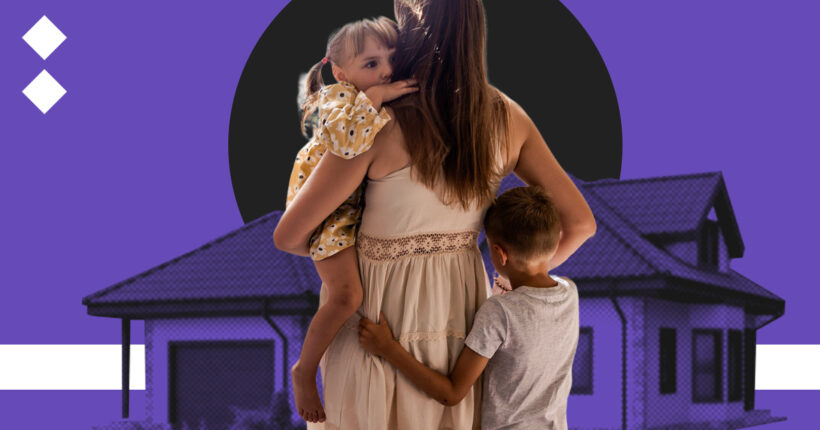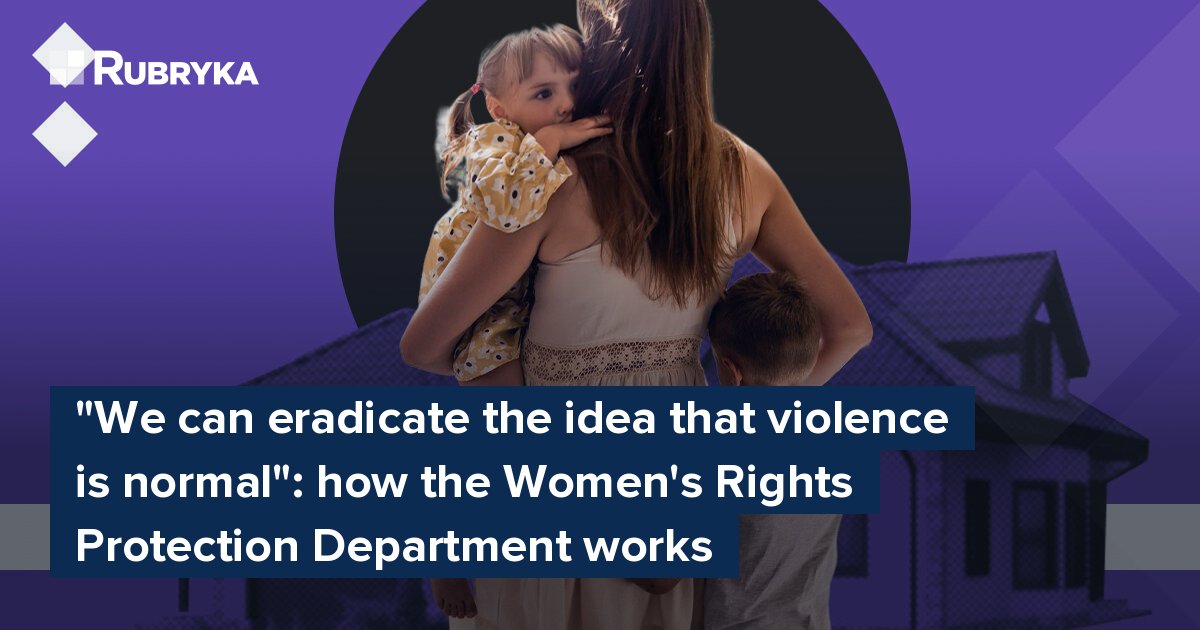
What is the problem?
The war did not cancel domestic violence. In 2022, the police and social protection authorities received 251,829 complaints about domestic violence. Of these, 244,381 applications and notifications of criminal offenses were registered. This is 25% less than in 2021. However, experts say there is no point in rejoicing over the decrease in appeal statistics.
Many women, and according to the YurFem Analytical Center, 96% of victims of domestic violence are women today, have fewer opportunities to appeal. Because of the war, they have become less mobile, and they are even more dependent on the offenders physically and materially. Often, women are confused and believe that today, it is simply not the time to voice their problems and ask for help.
What is the solution?
Since July 2023, the Women's Rights Protection Department has been operating in the crisis center for women with children, City of Goodness, in Chernivtsi. It was created to provide comprehensive assistance to women affected by domestic violence. Lawyers, psychologists, and doctors work with women here. Women are also taught financial literacy and independence.
How does it work?

For many women, City of Goodness often becomes a chance and hope. Photo from the archive of the organization
City of Goodness is a crisis center in Chernivtsi that has been protecting mothers and children who have found themselves in difficult life circumstances for several years. Philanthropist Marta Levchenko initiated its creation. Women who do not have relatives, who are often graduates of residential institutions and orphans, mainly turn to the shelter. For them, City of Goodness actually becomes a chance and hope for a normal life. With the beginning of the war, the center began to accept displaced women who were looking for salvation from domestic tyrants.
The founder of the crisis center, Marta Levchenko, says: "With pulled-out hair and blackened eyes, these women usually endure until the end because they have no money to rent a separate apartment, they have nowhere to go with the child, they have nothing to go to. Often, such women live in an atmosphere of violence for a very long time, and we know of many cases when they lost their lives because they simply had no one to turn to and no means of livelihood."
Also, these are women who tried to defend themselves, but they failed. Some of these women are themselves orphans and suffer from the pressure of their husband's influential family. These categories of women are the most vulnerable and need protection.
"I didn't know it was violence"
This phrase is often said by women who end up in the City of Goodness crisis center. Violence is not only bruises on the body. This is control, insults, coercion, and even inaction. But these are all crimes, the results of which are often deadly.
Before the creation of the department in the crisis center City of Goodness, women who fled from domestic violence were not only provided with sympathy, shelter, and food but were also provided professional consultations, helped to get back on their feet, get a profession, and housing. In short, there was a lot of work. They created the Women's Rights Protection Department when they noticed that on-the-spot legal assistance was no longer enough.

In the City of Goodness, women find shelter and help. Illustrative photo
"We saw that to protect women qualitatively, there must be a complex of services. This cannot be done if, for example, you book a woman only for an appointment with a lawyer. Sometimes, it is difficult for a specialist to take testimony if there is no psychologist nearby who can correctly ask this or that question. Or when no doctor can assess the injuries. Sometimes women don't even realize that the offender's actions are a crime, so they can't describe their problem to a lawyer," explains Levchenko.
The benefactor adds that it is also essential to be able to take evidence from children because they can also testify.
The fact that a child who has witnessed domestic violence is also a victim and needs protection is often not taken into account. This is not reflected in the reports of police officers who go to the site. For example, the law enforcement officers do not indicate how the child, who was next to their mother, suffered from the violence. The court does not take the child's testimony and opinion into account. "By creating such a department and involving in its work specialists who have experience in practical work in the field of protecting women's rights and representing their interests in court, we will finally be able to solve these and other problems," Levchenko told Rubryka.
In addition, according to Levchenko, earlier, the help was mainly received by those women who already lived in the City of Goodness. Instead, the department allows to help those women who are in other cities or other regions.
"The Women's Rights Protection Department is our priority"

The first meeting of the department, to which representatives of the Juvenile Police of the Chernivtsi Region and the Gender-Based Violence Counteraction Department of the Chernivtsi Region, were invited. Photo from the archive of the organization
In the crisis center, they are sure the well-being and psychological state of the child depends first of all on the protection of women's rights, and in the case of the City of Goodness, a mother with a child. This affects the baggage the child will grow up with and what their future will be.
"Saving each mother, first of all, we help her child. Therefore, today, the department is a priority for us," says the founder of the crisis center, Levchenko. They believe at the center that it is necessary to understand that the women who got to the City of Goodness are not just mothers with children who need help. They are women with pain, fear, mistrust of people, and despair. Therefore, it is important to establish communication and trust in specialists, give the woman a space of safety and confidentiality, and only then work with the case and its problems. If this stage is skipped, the help will be ineffective, and there will be a big risk that the woman will return to the abuser, adds lawyer Taisia Rubaniak, the head of the Department.
What help can women get from the Women's Rights Protection Department?

Consultation of women in the Women's Rights Protection Department. Photo from the archive of the organization
The Women's Rights Protection Department provides social services that include counseling, legal protection, psychological support, and other services to prevent and combat domestic violence.
"Domestic violence is not a new topic, but one gets the impression that for many people it is some fictional mystical character and not a real problem," notes Rubaniak. "People's awareness and the ability to identify and know how to respond to it plays a critical role in preventing domestic violence. Regarding combating domestic violence, it is important to provide effective, high-quality, comprehensive assistance to the victim."
First, assistance will be provided to women living in the City of Goodness, but at the same time, the department has created a hotline to which women from all over Ukraine can contact. They will be offered to come to Chernivtsi to the City of Goodness shelter. If, for certain reasons, women cannot do this, they will be assisted remotely, and specialists will be sought on the spot.

A psychologist from the City of Goodness communicates with a resident of the crisis center. Photo from the archive of the organization
Each story in the department is approached individually. A work plan is created for each mother. Rubaniak explains that before organizing the work of the department, the team asked themselves the question: 'What does a woman with a child need who wants to break the cycle of violence?' When they answered the question, the picture of the department's work immediately emerged.
In the City of Goodness, four primary needs of a woman who suffered from domestic violence were identified, and these directions were included in the department's work. These are free legal assistance, free psychological support, free medical assistance, and individual coach support regarding financial literacy and financial independence.
Does it really work?

"Every woman has her own story. My pain, my fear." Photo from the archive of the organization
The Women's Rights Protection Department has been working in Chernivtsi for a month. Today, it is working on 14 cases on various legal issues.
These are divorce, alimony collection, cohabitant eviction, paternity dispute, restraining order, change of alimony collection method, and others. Most cases have already been sent to court and scheduled for trial. Lawyers are preparing other cases that will also be sent to court.
"Every woman has her own story. Her pain, her fear. All stories are different, but simultaneously, they are so similar. Someone just wants to leave and forget everything, someone wants to live through this pain and cry, someone wants to run away from the abuser, and someone wants to run away from themselves, and that's all normal. We give the woman time to live through these feelings because that's how this is supposed to be. Domestic violence does not go unnoticed. It leaves scars that are equally painful for every woman," says Rubaniak.

Head of the Women's Rights Protection Department Taisia Rubanyak. Photo from the archive of the organization
The specialist admits that during the entire time of her work with such cases, she experienced many conditions.
"When I first started working with women who had experienced domestic violence, I cried in the evenings because I could not understand: why is this so? But over time, I learned to separate work and my personal boundaries. Now I don't cry, and I run to classical music. This way, I relieve myself and give myself time to live through these stories and move on. I believe that we can eradicate violence from the homes of Ukrainian women. We can save women and children. I saw these women who were saved; I hugged them when we finished the trials; I held their hands when they last remembered the terrible things that happened to them.".
Even more useful solutions!

Marta Levchenko and Taisia Rubaniak. Photo from the archive of the organization
The creation and functioning of the Women's Rights Protection Department in Chernivtsi is primarily about adequate protection and prevention of domestic violence. However, it is important to work not only with the case of violence but also to anticipate it. That is, to work with society to raise awareness about domestic violence, to work with stereotypes, and to raise zero tolerance for violence in society. This is also one of the main tasks of the department.
"We can eradicate women's opinion that violence is the norm," Rubaniak is confident. "For Ukraine to be free, we must also overcome domestic violence because the country begins with the family."
In the City of Goodness, they say they would like women who flee to shelters not to be condemned but, on the contrary, to be supported and helped. Anyone willing can join the work at the shelter, providing their services for free. These can be psychologists, notaries, or business coaches.

Incredible grandmothers: how grandparents are taught to help children and grandchildren in Lviv maternity hospital

Shirtless: how the forum theater helps displaced women in Poltava to start living again






